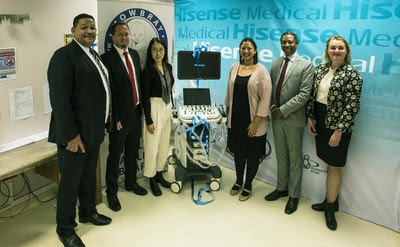LE CAP, Afrique du Sud, le 6 août 2022 /PRNewswire/ — À l’occasion d’une cérémonie de donation le 28 juillet, Hisense, fabricant et fournisseur d’appareils électroniques et médicaux à haute performance, a offert un appareil d’échographie haute résolution de pointe, l’échographe Hisense HD60, au Peninsula Maternity Trust pour la maternité de Mowbray pour annoncer sa collaboration et sa contribution à la maternité de Mowbray et au département de la santé du Cap-Occidental.

La maternité de Mowbray, située au Cap, est la plus grande maternité d’Afrique du Sud spécialisée dans les soins aux femmes présentant des grossesses à haut risque. Le professeur Ntusi, qui est président et médecin-chef à l’université du Cap (UCT) et au Groote Schuur Hospital, a gravi le Kilimandjaro en décembre dernier pour recueillir des fonds afin d’acheter un nouvel échographe pour le service d’anesthésie de l’hôpital.
Hisense South Africa a fait don d’un échographe HD60 en réponse aux efforts du Professeur Ntusi. La réception de cet appareil d’échographie de pointe doté de capacités de diagnostic améliorées fonctionnant grâce à l’IA intégrée relèvera le niveau de soins de la maternité de Mowbray et offrira de meilleures chances aux femmes à risque tout en stimulant le moral du personnel.
« Nous sommes très fiers de pouvoir faire don de cette machine à la maternité de Mowbray et au département de la santé du Cap-Occidental ; nous espérons et souhaitons que cela changera la vie des communautés environnantes en améliorant les capacités technologiques et médicales de l’hôpital tout en offrant aux professionnels de santé une innovation technologique de qualité et un soutien qui facilitera un peu leur vie professionnelle », a déclaré Ronele Prince, responsable des ventes médicales chez Hisense.
Hisense a conçu l’échographe HD60 pour offrir aux médecins une imagerie plus claire et à plus haute résolution affichée sur son écran de diagnostic 21,4″. L’appareil est livré avec une variété de sondes échographiques, ce qui le rend bien adapté pour répondre à plusieurs besoins de l’hôpital en matière d’anesthésie, d’obstétrique, de gynécologie et d’interventions cardiovasculaires.
L’échographe Hisense HD60 a été utilisé dans plus de 30 hôpitaux à travers la Chine, aidant à diagnostiquer plus de 50 000 cas. Pour son échographe HD60, Hisense a obtenu le marquage CE pour les dispositifs médicaux en décembre 2021 et la licence SAHPRA en Afrique du Sud en janvier 2022. En avril de cette année, Hisense a obtenu sa première commande de six échographes HD60 en Afrique du Sud, une étape importante pour devenir une marque de renommée internationale dans l’industrie de l’équipement médical.
Photo – https://mma.prnewswire.com/
